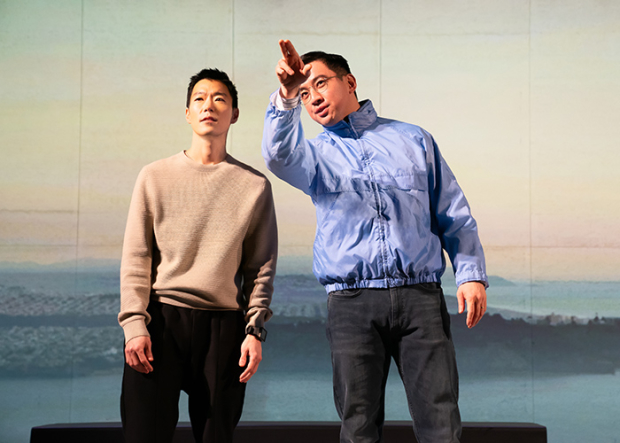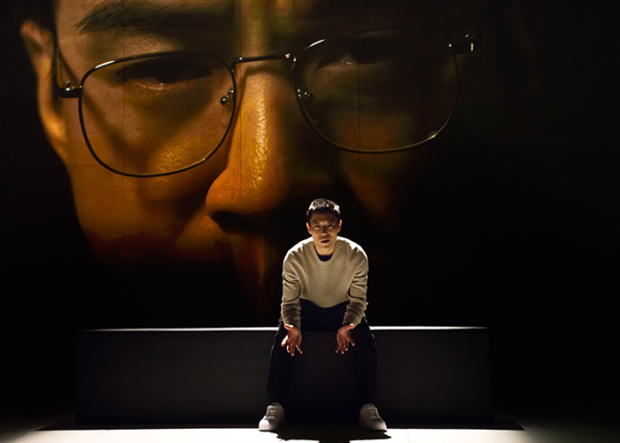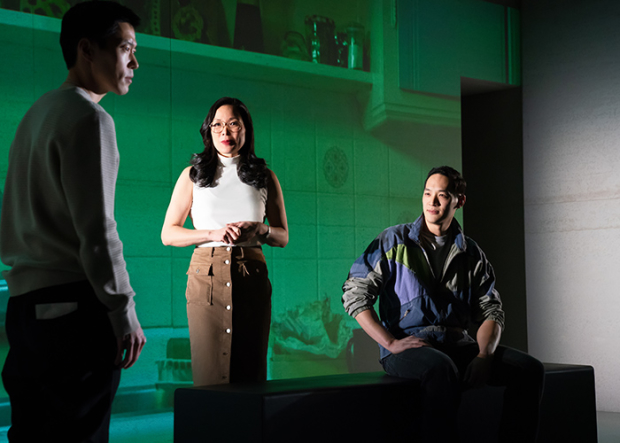The Headlands Blends Film Noir, Crime Thriller, and Family Drama
An amateur sleuth sets out to solve his father’s murder mystery in Christopher Chen’s new play at LCT3.

(© Kyle Froman Photography)
In The Headlands, the latest offering at LCT3's Claire Tow Theater, playwright Christopher Chen tries to elevate the classic "whodunit." Beyond the bread-and-butter intrigue of your average police procedural, Chen sets out to expose the whole backward-looking process of fact-finding and narrative-shaping for what it is: an inexact science clouded by perception, emotion, and bias. The mission for the play is clear. The results, however, are mixed.
Chen played a similar cat-and-mouse game (to great acclaim) in an earlier play, Caught, which used shifting perceptions of art to challenge the traditional American perception of Chinese politics. In The Headlands, he shrinks the scope to a single family, building a walking tour of all the vantages from which you can view your own upbringing. The character going on this harrowing trip down memory lane is Henry (Aaron Yoo, leading with youthful enthusiasm), a Google employee and sleuthing hobbyist who applies his amateur crime-solving skills to the 20-year-old case of his father's murder. A random burglary isn't a good-enough explanation anymore — but whether that dissatisfaction has more to do with the details of his father's cold case or his own surfacing demons is yet to be determined.
Narrating each step of his investigation, Henry looks back at his joyous jaunts to the title's Marin Headlands of San Francisco with his father George (Johnny Wu); the parental tiffs he has eavesdropped on as a child (Laura Kai Chen plays the younger version of his mother Leena); and the final days of his father's life, which in retrospect, hold some foreboding signs…or do they? Information provided by his father's former business partner (Henry Stram) and his now-deceased mother's best friend Pat (Mia Katigbak, who doubles as the older version of Leena) also refocus Henry's recon.

(© Kyle Froman Photography)
Peeling away these layers — family secrets, personal baggage, generations-old lies — should be a thrilling adventure. And for Chen's characters, these layers are enveloped in a specific Chinese-American story with unique cultural stakes (George and Leena meeting as first- and second-generation immigrants, respectively). But as revelations are ripped off like Band-Aids, surprises that should have snuck up on us with thoughtful subtlety end up feeling clunky and anticlimactic. They also keep the piece feeling like the rote crime thriller it doesn't want to be.
Shifting perspectives and rock-solid truths that disintegrate before your eyes should be the magic of this production. But unless we're the ones regrouping the facts ourselves, that theatrical magic trick becomes little more than a collection of characters correcting falsehoods. That effectively sums up the main narrative function of Henry's girlfriend Jess (a charming performance by Mahira Kakkar, but the other half of a passionless couple), who innocuously joins in his game of detective until removing herself in frustration with a sweeping explanation of all of Henry's biases toward the case.
In the spirit of classic murder mystery, the play borrows style elements from film noir — though to what creative end, Chen and director Knud Adams still seem undecided. From Henry's omniscient narration, to the illustrative black-and-white projections (designed by Ruey Horng Sun), to the revised memories of his parents playing and replaying behind him in shadowy lighting (designed by Mark Barton), the effect fluctuates from melodrama to camp. And you can never quite tell which, if either of those spaces, The Headlands would prefer to be sitting in. In all other respects, in fact, the play takes itself rather seriously. A young man venturing into adulthood is questioning his life, his memories, and his family legacy while also coming to terms with the grisly murder of his father. With all of that genuine tension spinning around, broadcasting more drama accomplishes just the opposite.

(© Kyle Froman Photography)








